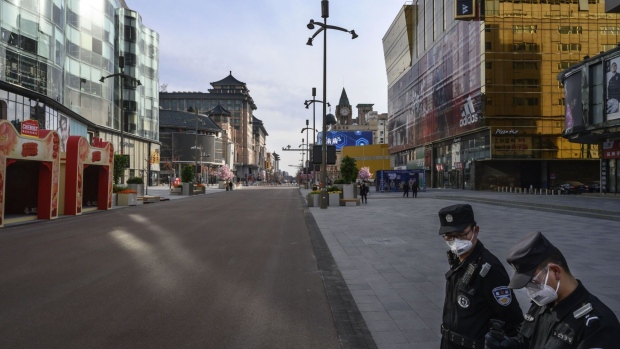Feb 18, 2020
Deaths Hit 2,000; New Hubei Cases Continue to Drop: Virus Update
, Bloomberg News

(Bloomberg) -- China’s death toll from the new coronavirus reached 2,000, while Hubei province at the center of the outbreak continued to report fewer additional cases.
Hubei reported 132 more deaths and 1,693 new cases, bringing the number of total worldwide infections to more than 75,000. The level of additional cases from the province is the lowest since it changed its method for counting infections last week.
China’s strict quarantine likely bought the rest of the world several weeks to prepare for the virus, according to the World Health Organization. Hubei said it will examine recent purchases of fever and cough medicines to sweep for unidentified infected patients.
Key Developments
- LATEST: China death toll at 2,000, global confirmed cases top 75,000
- Hubei adds 132 fatalities, 1,693 cases; 1,266 patients discharged
- Apple’s cut revives questions about China over-reliance
Click VRUS on the terminal for news and data on the novel coronavirus and here for maps and charts. For analysis of the impact from Bloomberg Economics, click here.
China’s Coronavirus Death Toll Hits 2,000 (7:00 a.m. HK)
China’s Hubei province reported 132 new coronavirus fatalities for Feb. 18, bringing the death toll on the mainland to 2,000.
Total confirmed cases in Hubei rose by 1,693 to 61,682, Hubei’s health commission said in a statement. Discharged patients increase by 1,266 to 9,128.
China Measures Seem to Have Delayed Spread, WHO Says (2:50 p.m. NY)
China’s aggressive quarantine tactics delayed the spread of the coronavirus from the outbreak’s center, said a top official at the World Health Organization. Officials in China’s Hubei province locked down travel to and from the province, and later sharply restricted people’s ability to leave their homes.
“Those measures on movement restriction have delayed the dissemination of the outbreak by two or three days within China, and two or three weeks outside China,” said Sylvie Briand, the WHO’s director of global infectious hazard preparedness.
Briand said that estimate was based on modeling of the disease’s spread, and it will take time to know for certain.
Russia Bans Chinese Citizens From Entry (1:05 p.m. NY)
Russian Prime Minister Mikhail Mishustin signed an order temporarily banning Chinese citizens from entering Russia for tourism, personal reasons or work starting Thursday, Interfax reported, citing Deputy PM Tatyana Golikova’s office. The ban doesn’t apply to passengers continuing to a destination outside Russia.
China Aims to Stabilize Trade, Promote Consumption (10:25 a.m. NY)
China’s Commerce Ministry will take steps to help stabilize the nation’s foreign trade and prod consumption in a bid to reduce the impact of coronavirus outbreak on commercial activities, the ministry said in statement.
Sanofi to Work on Coronavirus Vaccine (10 a.m. NY)
French pharmaceutical company Sanofi jumped into the race to combat the fast-spreading coronavirus, betting that earlier work in pursuit of a SARS vaccine could accelerate its effort.
Read the full story here.
Hubei Will Search for People Who Bought Fever Drugs (7:24 a.m. NY)
China’s Hubei province said it will use recent purchases of fever and cough medicines to sweep for unidentified coronavirus patients, a new step that leverages the government’s surveillance powers to try and stop the virus.
The province has enacted a lockdown of tens of millions of people, opened new hospitals and isolation centers, mandated self-reported temperature checks, and conducted house-to-house searches for people showing symptoms. The measures have coincided with a drop in newly reported cases in Hubei, where the outbreak began and most infections and deaths have occurred.
The government will investigate anyone who bought fever or cough medicines since Jan. 20, whether they were purchased from brick-and-mortar stores or online. It will also track down anyone who sought treatment for a fever since then. Anyone selling treatments for a cough or fever will have to check and register and report the patient’s identity, the provincial government said.
China’s authorities have broad powers of surveillance, enabled by an almost totally mobile-based payment systems that are integrated into most aspects of everyday life. While they’ve helped control movement in the province and the city of Wuhan, creating a regional quarantine, citizens there have complained of harsh treatment and short supplies as the lockdown drags on.
More Companies Warn on Virus Impact (7:24 a.m. NY)
Walmart Inc.’s CFO said the virus could lower first-quarter earnings per share by a few cents. The retailer said it had closed “less than a handful” of stores in the country. Separately, Medtronic said it expected the outbreak to impact fourth-quarter results, but that this was hard to quantify.
Earlier, Apple slumped after saying it wouldn’t be able to hit sales targets. The news drove down U.S. stock futures, as well as shares in European chipmakers and Asian suppliers.
To contact Bloomberg News staff for this story: Michelle Fay Cortez in Minneapolis at mcortez@bloomberg.net
To contact the editors responsible for this story: Drew Armstrong at darmstrong17@bloomberg.net, Mark Schoifet, Jeff Sutherland
©2020 Bloomberg L.P.